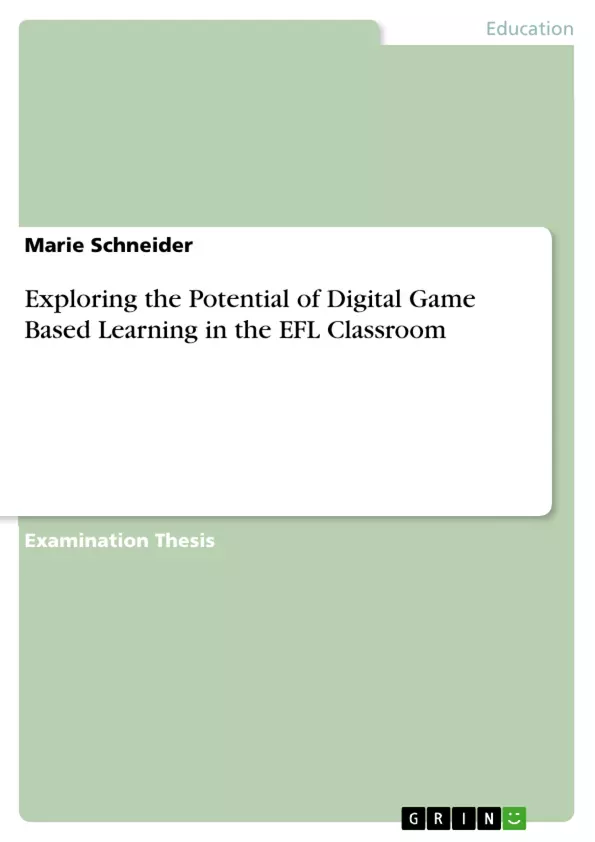Die Staatsexamensarbeit trägt den Titel “Exploring the Potential of Digital Game Based Learning in the EFL Classroom” und lotet das Potenzial kommerzieller Computerspiele für die Ausbildung von Fach- und Medienkompetenz im Englischunterricht aus. Im Unterschied zu bisherigen Untersuchungen werden Computerspiele dabei nicht als Unterrichtsthema sondern als Werkzeug bzw. Methode unter die Lupe genommen.
Die innovative Arbeit nimmt einen neuen Blickwinkel auf das Thema ein und trägt so zu einem noch sehr jungen Forschungsfeld bei, auf welchem – vor allem in Deutschland – nur wenige Publikationen erschienen sind und welches somit nur in Ansätzen untersucht worden ist.
Inhaltsverzeichnis (Table of Contents)
- 1 MAIN MENU - An Introduction
- 2 NEW GAME – Digital Game Based Learning
- 3 TUTORIAL - Digital Games
- 3.1 Definition
- 3.2 Taxonomy of Games
- 3.3 Why Do People Play? The Fascinating World of Games
- 4 LOAD Game Studies
- 4.1 What are Game Studies?
- 4.2 Ludology vs. Narratology
- 4.3 Narrative & Interactivity
- 4.4 Cyberdrama & Cinematography
- 4.5 The Secret Curriculum
- 5 OPTIONS – Scratching the Surface: Psychological Studies
- 5.1 Transfer & "Framing Competence"
- 5.2 Violence
- 6 RESUME GAME Didactic Studies
- 6.1 The Youth of Today: Digital Natives
- 6.2 How Do People Learn? Learning Theories and Environment
- 6.3 A Bad Start
- 6.4 Legitimation
- 6.5 Potential
- 7 SAVE GAME
- The Real Deal: Digital Games in School
- 7.1 The Spoke in the Wheel: Obstacles
- 7.2 And Still: Examples for successful uses of COTS games in the classroom
- 7.2.1 DGBL projects
- 7.2.2 Teaching material
- 7.3 Choosing a Game
- 7.4 Implementing a Game
- 7.4.1 Games as Learning Systems
- 7.4.2 Strategies for Teachers
- 7.4.3 Types of Projects
- 7.4.4 Planning a Project
- 7.4.5 DGBL Activities in the EFL Classroom
- 7.5 Assessing Digital Game Based Learning
- 7.6 In Session
- 7.6.1 Draft in Progress
- 7.6.2 Games in the EFL Classroom
- 8 QUIT - A Summary
Zielsetzung und Themenschwerpunkte (Objectives and Key Themes)
The main objective of this paper is to explore the potential of digital game-based learning in the English as a Foreign Language (EFL) classroom. The author aims to address the ongoing debate about the role of digital games in education and argue for their integration as a valid learning tool. Here are some key themes that will be explored: * The prevalence and impact of digital games in the lives of young people * The potential benefits of digital game-based learning, including the development of skills such as concentration, strategic thinking, and deductive reasoning. * The challenges and obstacles surrounding the implementation of digital games in the classroom, such as concerns about violence and the perceived negative influence of games. * The historical and cultural context of the debate surrounding new media, particularly in Germany. * The need for media literacy to empower students to critically engage with digital games.Zusammenfassung der Kapitel (Chapter Summaries)
This section summarizes the main themes and arguments of each chapter, excluding the conclusion, final chapter, and any sections containing major revelations or spoilers.- Chapter 1: "MAIN MENU - An Introduction" This chapter introduces the central question of the paper: can digital games be effectively used in the EFL classroom? It highlights the widespread use of digital games among young people, arguing that they are an important part of their lives and should be recognized as a valuable learning tool. The chapter also discusses the historical resistance to new media in Germany and the need for media literacy.
- Chapter 2: "NEW GAME – Digital Game Based Learning" This chapter provides a detailed overview of digital game-based learning (DGBL), defining key concepts and exploring the potential of this approach to enhance language learning.
- Chapter 3: "TUTORIAL - Digital Games" This chapter delves deeper into the world of digital games, providing a taxonomy of game types and discussing the psychological factors that contribute to their popularity. It explores the motivations behind gaming and examines the relationship between games and real-world experiences.
- Chapter 4: "LOAD Game Studies" This chapter explores the field of game studies, focusing on its theoretical underpinnings and methodologies. It discusses the distinction between ludology and narratology and examines the intersection of narrative and interactivity in games. It also explores concepts such as cyberdrama, cinematography, and the "secret curriculum" of games.
- Chapter 5: "OPTIONS – Scratching the Surface: Psychological Studies" This chapter analyzes the potential psychological benefits and risks associated with digital game-based learning. It examines the concept of "framing competence" and the role of digital games in transferring skills from the virtual to the real world. It also addresses concerns about the potential impact of violence in games.
- Chapter 6: "RESUME GAME Didactic Studies" This chapter explores the potential of digital games in formal education, taking into account the characteristics of "digital natives" and the broader landscape of learning theories and environments. It addresses historical biases against digital games in education and argues for their legitimization as a valuable learning tool. The chapter concludes by highlighting the significant potential of DGBL for EFL instruction.
Schlüsselwörter (Keywords)
This paper focuses on the integration of digital games in the English as a Foreign Language (EFL) classroom, examining key aspects of digital game-based learning (DGBL) and its potential to enhance language acquisition. The text analyzes the historical and cultural context of the debate surrounding new media in Germany, particularly the skepticism towards digital games. The paper also emphasizes the importance of media literacy and the development of "framing competence" to enable students to critically engage with and benefit from digital games. Key concepts explored include ludology, narratology, cyberdrama, the "secret curriculum," transfer of skills, and the impact of violence in games. - The Real Deal: Digital Games in School
- Quote paper
- Marie Schneider (Author), 2011, Exploring the Potential of Digital Game Based Learning in the EFL Classroom, Munich, GRIN Verlag, https://www.grin.com/document/201318



